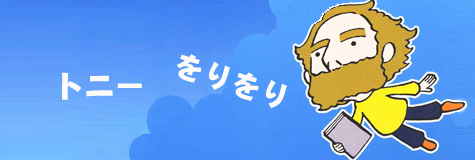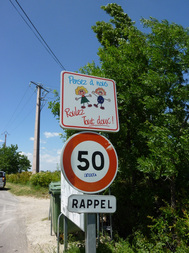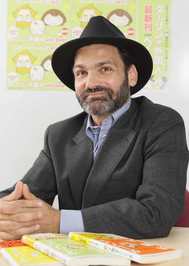
その四 翻訳されるもんか
トニー・ラズロ
言語研究家
 自筆の文は自分で訳さない(4月1日発行の「翻訳なんてするもんか」参照)。でも、だからと言ってその作業をほかの人に任せていいと思っているかと言うと、そうでもない。自分が何を言いたいのか、一番よくわかっているのは、自分。一方、他人は......他人は僕の言いたいことをわかっていない。だから人が翻訳した原稿を読み通していると、約二分おきに小さな声を上げてしまう。「なに、これ!」や「ん...惜しいなあ」がその悲鳴の典型例。
自筆の文は自分で訳さない(4月1日発行の「翻訳なんてするもんか」参照)。でも、だからと言ってその作業をほかの人に任せていいと思っているかと言うと、そうでもない。自分が何を言いたいのか、一番よくわかっているのは、自分。一方、他人は......他人は僕の言いたいことをわかっていない。だから人が翻訳した原稿を読み通していると、約二分おきに小さな声を上げてしまう。「なに、これ!」や「ん...惜しいなあ」がその悲鳴の典型例。
もちろん、翻訳者は一生懸命著者の意図を探っている。そして原文に「匹敵するかな」と思う言葉を書こうとしている。プロであり、一生懸命働いているから著者から「わかっていない」と思われたり、ましてそう言われたりしたくない。でも、その人がたとえ能力や感性が優れていた持ち主であっても、著者としてただ黙って、その翻訳の作業を横から見守るのはかなり難しい。なぜなら、やはり"正解"を知っているからだ。
ここで、翻訳業を営んでいる三百名くらいの人がいっせいに「翻訳に正解などない」と叫んだと思う。そしてほかの三百名は「正解は複数ある」、と。一般論として、そのような認識で正しいだろう。でも、ある条件下では「正解は一つしかなく、そして著者はそれを持っている」と言えると思う。それは、著者が自分で翻訳できるとき。たとえば、僕のような英語母語話者の書いた和文が英語に直される場合。このとき、著者には原文と訳文の両方が自分の心の声なのだ。
 たとえば、僕が「するとハエが部屋に入ってきた」という和文を書いたとしよう。この「ハエ」をどう訳したらいいか。「fly」?一匹ならそれでいいのだが、部屋に入ってきたのは2、3匹だったら「flies」にならなくてはいけない。でもハエが単数だったか複数だったか、原文だけを見る翻訳者にはわからない。ハエと部屋が頭の中で見えている、原文を書いた本人だけが真相を知っている(ちなみに、2匹でした。大きいのと小さいのが一匹ずつ)。
たとえば、僕が「するとハエが部屋に入ってきた」という和文を書いたとしよう。この「ハエ」をどう訳したらいいか。「fly」?一匹ならそれでいいのだが、部屋に入ってきたのは2、3匹だったら「flies」にならなくてはいけない。でもハエが単数だったか複数だったか、原文だけを見る翻訳者にはわからない。ハエと部屋が頭の中で見えている、原文を書いた本人だけが真相を知っている(ちなみに、2匹でした。大きいのと小さいのが一匹ずつ)。
次に「そこでハエが部屋に入ってきた」の「入ってきた」という部分。これをどうしたらいいか。一般には「入る」が「enter」とか「come into」と訳される。この例文の場合でも、そのどちらも一応ありうるかもしれない。でもハエは飛ぶ昆虫なので、「fly into」も可能性ある。そしてかなりの速度で動くものでもあるので「zoom into」も「zip into」もそれぞれ候補。ほかにもいくつか言い方はある。ここでも著者はハエはどう動いたか、その動きをどう表現すべきかは、原文を書いた段階でもうわかっている。一方、翻訳者は勘を働かせて"正解"を見つけようとするが、著者の心の声へのアクセスがないから、結局推理していくしかない(かわいそうに)。
さてと、話を少し整理してみよう。自分の文を翻訳できるのに、それをけっしてしようとしないある著者が、ほかの人にもその翻訳を許さない。なぜなら自分が書いた文を一番よくわかっており、自分もそれを翻訳できるからだ。
言い換えれば、この著者は翻訳の否定論者だ。「翻訳の否定論者」。それを英語に直すと......面白くないくなるので、やーめよう。

I don't translate my own writing (i.e. "Who Wants to Translate", published April 1, 2011). That doesn't necessarily mean that I would rather turn that work over to someone else. I am the one who most understands what it is I want to express. Someone else, on the contrary, doesn't understand what I want to say. So I tend to squeal every two minutes when I proofread a translated version of my own writing. Typical examples of my squeals are, "What is this?" and, then, "Well . . .it's close".
Of course, translators try very hard to find the author's message and use words that "most likely match" the original writing. Translators are professionals and don't want the author thinking, "This one doesn't quite get it," or, even worse, to hear the author actually verbalize that. Still, it is quite hard as an author to look at a translator's work from the sidelines and keep quiet, no matter how talented or sensible the translator could be. This is because I am the one who knows the "right answer"
Now, I bet about 300 professional translators screamed all at once, "There is no right answer in translation!" And another 300 must have said "There are multiple right answers". Generally speaking, that's probably the correct interpretation of the work of translation. But we can also say, "There is only one right answer and the author knows it", when we are under a certain condition. That is, when the author is capable of translating. For example, when Japanese writing done by a native English speaker, like me, is translated into English, both the original writing and the translation are both in the author's own voice.
Let's say that I wrote, "Then, a fly came into the room" in Japanese. How should a "fly" be translated? "Fly"? That's fine if it was only one fly that came in, but if there were two or three flies, it should be flies. But the translator wouldn't know by reading the original copy whether this fly is singular or plural, because in Japanese there is no difference whether singular or not. Only the author with the image of the room and the fly knows the truth. (By the way, there were two. A big one and a little one.)
Then also, there's a question about translating the phrase "came into" of "Then, a fly came into the room". In general, the Japanese term "come in" will be translated as "enter" or "come into" and those translations could work in this example. At the same time, there's a possibility of "fly into" since flies are flying insects. And since they move pretty fast, there are options of "zoom into" and "zip into," and some other ways to express it. So even here, the author already knows how to express the flies' moving at the time he writes the original. On the other hand, the translator could only assume the "right answer" by instinct because one cannot access the author's mind. Poor translators.
So let's pull things together here a little bit. This author, because he knows best about his writing, and can translate it himself but never would, still will not allow others to translate his materials.
In another words, this author is a denier of translation, a "translation denier". To translate this in English...? Oh, let's not do that. It would ruin it.
言語研究家 ハンガリーとイタリアの血を受け継ぎアメリカで育つ。1985年来日。 85年より日本を拠点としてライター活動を開始。92年から多文化共生を研究するNGO「一緒企画(ISSHO)」を運営。 漫画家、小栗左多里の夫であり、「ダーリンは外国人」のダーリン。 自他ともに認める語学オタク。現在一児の父。著書に「トニー流幸せを栽培する方法」、「ダーリンの頭ン中」「イタリアで大の字―さおり&トニーの冒険紀行」「ダーリンは外国人 with BABY」などがある。


